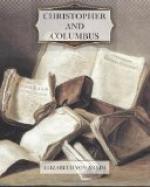The black porter, whose heart happened not to be black and who had children of his own, perceived the helpless ignorance that lay behind the twins’ assumption a of severe dignity, and took them in hand and got seats for them in the parlour car. As they knew nothing about cars, parlour or otherwise, but had merely and quite uselessly reiterated to the booking-clerk, till their porter intervened, that they wanted third-class tickets, they accepted these seats, thankful in the press and noise round them to get anything so roomy and calm as these dignified arm-chairs; and it wasn’t till they had been in them some time, their feet on green footstools, with attendants offering them fruit and chocolates and magazines at intervals just as if they had been in heaven, as Anna-Felicitas remarked admiringly, that counting their money they discovered what a hole the journey had made in it. But they were too much relieved at having accomplished so much on their own, quite uphelped for the first time since leaving Aunt Alice, to take it particularly to heart; and, as Anna-Felicitas said, there was still the L200, and, as Anna-Rose said, it wasn’t likely they’d go in a train again for ages; and anyhow, as Anna-Felicitas said, whatever it had cost they were bound to get away from being constant drains on Mr. Twist’s purse.
The train journey delighted them. To sit so comfortably and privately in chairs that twisted round, so that if a passenger should start staring at Anna-Felicitas one could make her turn her back altogether on him; to have one’s feet on footstools when they were the sort of feet that don’t reach the ground; to see the lovely autumn country flying past, hills and woods and fields and gardens golden in the October sun, while the horrible Atlantic was nowhere in sight; to pass through towns so queerly reminiscent of English and German towns shaken up together and yet not a bit like either; to be able to have the window wide open without getting soot in one’s eyes because one of the ministering angels—clad, this one, appropriately to heaven, in white, though otherwise black—pulled up the same sort of wire screen they used to have in the windows at home to keep out the mosquitoes; to imitate about twelve, when they grew bold because they were so hungry, the other passengers and cause the black angel to spread a little table between them and bring clam broth, which they ordered in a spirit of adventure and curiosity and concealed from each other that they didn’t like; to have the young man who passed up and down with the candy, and whose mouth was full of it, grow so friendly that he offered them toffee from his own private supply at last when they had refused regretfully a dozen suggestions to buy—“Have a bit,” he said, thrusting it under their noses. “As a gentleman to ladies—no pecuniary obligations—come on, now;” all this was to the twins too interesting and delightful for words.
They accepted the toffee in the spirit in which it was offered, and since nobody can eat somebody’s toffee without being pleasant in return, intermittent amenities passed between them and the young man as he journeyed up and down through the cars.




